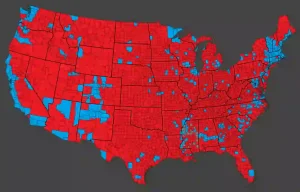Introduction
Throughout history, many nations have sought to understand their role in the grand narrative of divine prophecy. America, despite its global prominence, is conspicuously absent from explicit mention in the Bible’s prophetic texts. Could this omission be a reflection of America’s historical and moral failings? This post examines the treatment of Native Americans, the institution of slavery, the persistent influence of white supremacy within the Southern Baptist tradition, and the election of Donald Trump to understand how these factors might align with broader themes of judgment and prophecy.
The Treatment of Native Americans
When European settlers arrived in the Americas, they were often driven by the notion of divine destiny, believing their conquest and colonization were sanctioned by God. This belief justified the slaughter, displacement, and cultural erasure of Indigenous peoples. Entire tribes were decimated, their lands seized, and their way of life obliterated under the guise of progress and civilization.
From a biblical perspective, such actions raise profound questions about moral accountability. The Bible repeatedly emphasizes the importance of justice, mercy, and compassion. Micah 6:8, for instance, calls for humanity to “act justly, love mercy, and walk humbly with [their] God.” The settlers’ actions stand in stark contrast to these principles, suggesting that America’s foundation may have sown seeds of moral and spiritual decay.
The Stain of Slavery
The enslavement of African peoples represents another dark chapter in America’s history. For centuries, millions of men, women, and children were forcibly removed from their homelands, subjected to inhumane treatment, and denied basic rights. The economic prosperity of early America was built on the backs of these enslaved individuals, whose suffering was justified by a twisted interpretation of scripture.
Many slaveholders used the Bible to defend slavery, citing passages out of context to promote a system of oppression. This misuse of scripture not only perpetuated injustice but also corrupted the spiritual integrity of those who claimed to follow Christ. The echoes of this injustice continue to reverberate in modern racial inequalities, further challenging America’s moral standing.
White Supremacy and the Southern Baptist Tradition
The Southern Baptist Convention, one of America’s largest Protestant denominations, was founded in 1845 on the premise of defending slavery. Its early leaders argued that slavery was ordained by God and used biblical justifications to support the subjugation of Black people. This racist foundation laid the groundwork for a culture of white supremacy within the denomination, a legacy that persists in subtle but significant ways.
While the Southern Baptist Convention has made attempts to address its past—including issuing a formal apology for its support of slavery in 1995—critics argue that systemic racism and white supremacist attitudes remain entrenched. These attitudes have not only damaged the denomination’s witness but also contributed to the broader narrative of racial division in America. From a prophetic perspective, the church’s failure to embody Christ’s teachings on love and unity may be seen as a reflection of America’s spiritual failings.
The Election of Donald Trump
The election of Donald Trump in 2016 marked a pivotal moment in American history. Trump’s presidency was characterized by divisive rhetoric, policies that marginalized vulnerable populations, and an emboldening of nationalist and racist ideologies. His ascent to power, supported by many evangelical Christians, raised questions about the moral compass of the nation.

For some, Trump’s presidency symbolized a turning away from the principles of justice and humility. His alignment with white nationalist groups and his inflammatory remarks about immigrants and minorities revealed deep fractures within American society. In the context of Bible prophecy, such a period of moral decline could be interpreted as a precursor to divine judgment or a sign of a nation losing its spiritual authority.
Why America Might Be Absent from Bible Prophecy
The absence of America in Bible prophecy has long puzzled theologians and believers. Several theories attempt to explain this omission. One possibility is that America’s moral and spiritual failings have rendered it unworthy of mention in divine texts. Another theory suggests that America’s influence will diminish over time, making it irrelevant in the events of the end times.
The historical actions discussed above—the slaughter of Native Americans, the enslavement of Africans, the persistence of white supremacy within religious institutions, and the rise of divisive leadership—paint a picture of a nation that has repeatedly fallen short of biblical principles. Could these failings be the reason for America’s absence in prophecy? The Bible frequently warns that nations and leaders who stray from God’s commands face judgment. Proverbs 14:34 reminds us, “Righteousness exalts a nation, but sin condemns any people.”
Conclusion
America’s history is a tapestry woven with triumphs and tragedies, moments of greatness overshadowed by profound injustices. As we reflect on the nation’s past and present, it becomes clear that its absence from Bible prophecy may serve as a cautionary tale. The treatment of Native Americans, the institution of slavery, the legacy of white supremacy, and the election of leaders who embody division and moral compromise are all threads in this complex narrative.
For truth-seekers, this reflection is not merely an academic exercise but a call to action. It challenges us to confront historical and present injustices, to seek repentance and reconciliation, and to strive for a nation that aligns more closely with the principles of justice, mercy, and humility. In doing so, we honor the truths of scripture and pave the way for a more righteous future.
Finally, American politics often intertwine with religious symbols, such as the cross, and invoke the rhetoric of being aligned with God’s chosen political party. This conflation of religion and politics raises significant questions about the integrity of spiritual values within the public sphere. By associating specific political agendas with divine approval, leaders and institutions risk alienating those who see faith as transcendent and universal, rather than a tool for partisan gain. This dynamic further complicates America’s spiritual narrative, revealing a nation deeply divided over its understanding of morality, justice, and divine purpose.
Join FB Group
